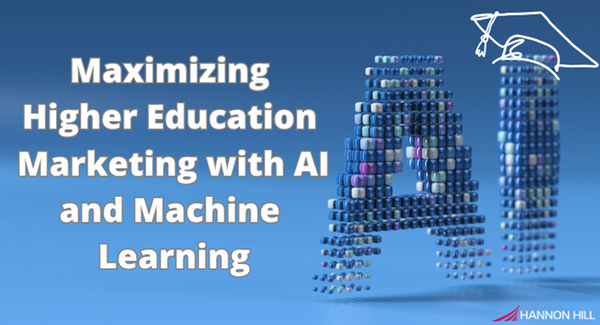
Artificial intelligence (AI) and machine learning have firmly entrenched themselves in modern society.
Higher-ed institutions face the choice of either embracing these transformative technologies or risk being left. While many adhere to traditional approaches, the need to adapt to meet the evolving needs of students is undeniable.
These powerful tools hold the promise of revolutionizing how schools communicate with students and optimize marketing strategies. However, their transformative potential can only be realized if higher-ed marketers are willing to embrace them.
According to a report by the education technology firm Anthology, U.S. schools lag behind their international counterparts in adopting AI, in more ways than one. Most notably, more than 30 percent of institutional leaders in the U.S. express reservations about the ethical implications of AI in higher education.
With many institutional leaders who are hesitant about AI adoption, understanding and implementing a predictive content strategy could prove instrumental in overcoming these challenges and fostering stronger student engagement.
Predictive content strategy involves leveraging data and advanced algorithms to forecast the needs and preferences of target audiences. By analyzing past data and trends, AI and machine learning algorithms can predict future behaviors, enabling higher ed marketers to tailor their content with precision.
The Growth Collective states that “the global market for predictive analytics is expected to reach a value of $67.86 billion by 2032,” so while higher education may still be on the fence, the data points that the direction of AI in marketing is here to stay.
They also suggest that search engine algorithms are changing, making it harder than ever for businesses to reach their intended customers, no matter how much content they produce.
So how does this impact higher ed marketers in their goal to reach more students — while also preparing for the looming enrollment cliff?
Prospective students are seeking highly personalized, engaging, and interactive content that resonates with their unique needs and interests. However, generating such content at scale presents a big challenge for higher education marketers.
With a wide array of student segments to cater to and preferences rapidly evolving, traditional marketing approaches fall short. This is where predictive content strategy emerges as a game-changer.
Predictive content strategy seamlessly integrates human expertise and creativity with the capabilities of AI, providing marketers with a distinct advantage in their content strategies.
This proactive approach meets students where they are, empowering schools to deliver personalized, relevant content, and boosting higher engagement and conversion rates.
AI and machine learning technology play a pivotal role in enabling predictive content strategy in higher ed marketing. These cutting-edge technologies can sift through vast amounts of data in real time, uncovering invaluable insights that human marketers might overlook.
This insightful article from RNL goes into a 360 approach of applying AI to all areas of schools to maximize its results — sharing that using a content strategy involving AI could be the solution to top-notch communication throughout campuses.
By harnessing the power of AI and machine learning, institutions can gain actionable insights into the behavior, preferences, and interests of prospective or current students, allowing for the creation of targeted and impactful marketing campaigns.
Not to mention the ability to transform any communications to fit any of their demographic needs — alumni, parents, donors, faculty, staff, and more.
One of the most interesting (maybe even controversial) partnerships recently announced is Arizona State University partnering with OpenAI — the creator of ChatGPT. Some may have their doubts, but it may also be an innovative step toward the future. Not only are they allowing approved university members to have access to the latest version of ChatGPT.
Their primary goal is to start and expand the institutional-level partnership to help “ensure equitable access for students who are going to go into the workplace and have access to these technologies,” and to make “an investment in the future of technology innovation.”
Another unique example is Georgia State's AI-driven chatbot, named 'Pounce,' which was initially designed to aid incoming students with college essentials like finances and registration, but has since proven to be a game-changer in boosting student academic performance.
Through analysis, the university discovered that students leveraging Pounce received timely updates on assignments, academic support, and course materials were significantly more likely to achieve a B grade or higher. Notably, for first-generation immigrant students, Pounce facilitated a remarkable 11-point increase in final grades compared to their peers.
The profound impact of implementing this AI-driven chatbot has aided across campus in more ways than one, while also providing access to students of high need or high risk, while also eliminating the need for human-based 24/7 support — saving time, resources, and money.
Universities leveraging AI and predictive analytics can personalize student experiences and anticipate their evolving needs.
These technologies enable the analysis of vast data, offering precise, impactful content and insights.
Embracing this rapid technological evolution, institutions can lead in innovative higher education marketing, adapting to changes and attracting students effectively in the digital era.
Last Updated: Apr 11, 2024 11:00 AM